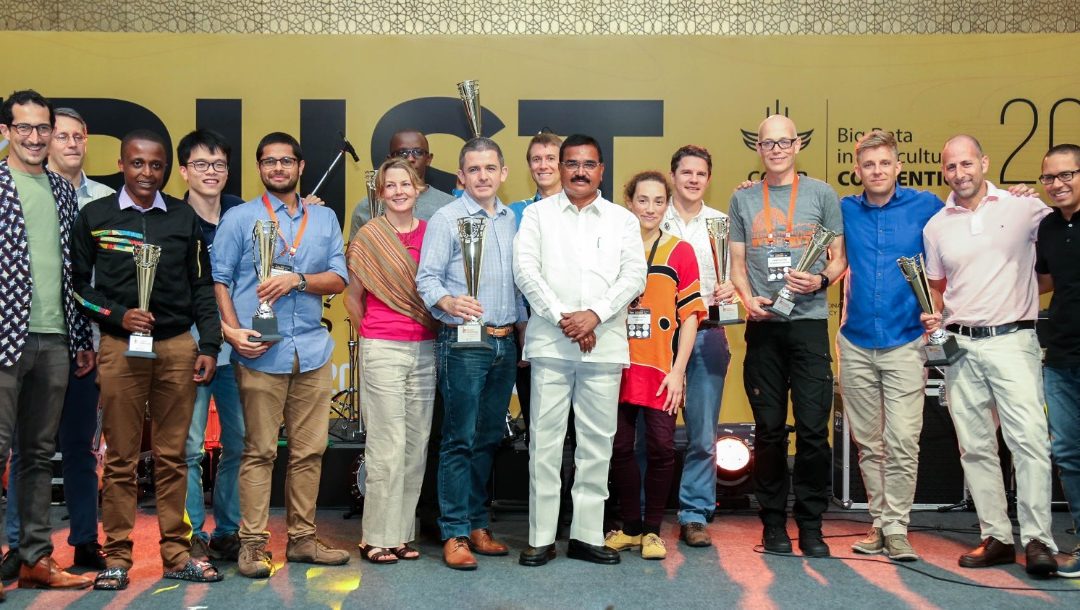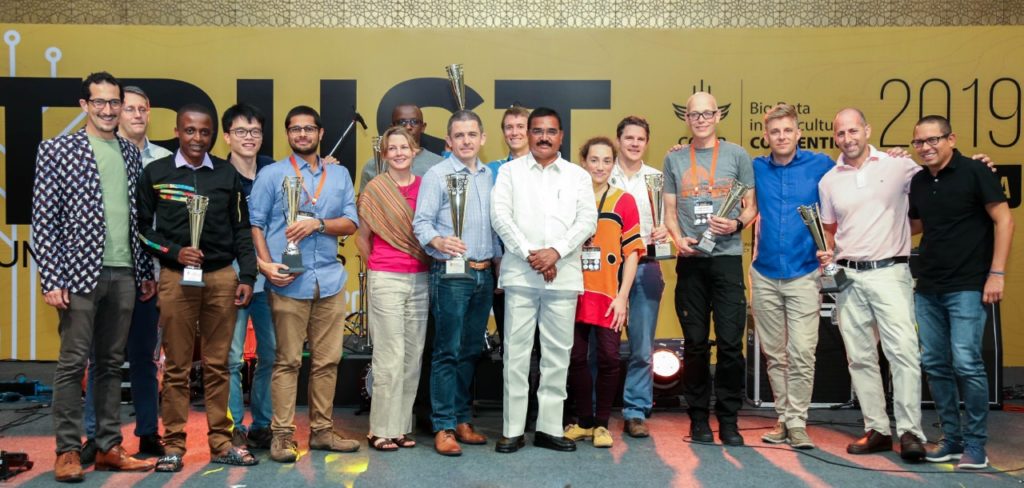Meet the 2019 Inspire Challenge winners selected at BIG DATA Convention
Now in its third year, the BIG DATA Platform’s Inspire Challenge has invested more than two million USD in innovative big data projects that seek to solve agricultural development issues.
Each project represents a meaningful partnership between a CGIAR Centre and an external organization (academic, governmental, private sector, NGO, etc.) and mobilizes underused or misused data, especially CGIAR data, to better the lives of smallholder farmers in the developing world.
“The Inspire Challenge is CGIAR’s signature digital innovation process, leveraging our presence in over 70 countries, some 8,000 experts touching on virtually every aspect of food security, and our vast global partnership networks,” said Coordinator for the BIG DATA Platform Brian King.
“This third stellar cohort of Inspire Challenge awardees demonstrates the power of collective action, research rigor, and digital innovation in a way that only CGIAR could.”
More than 150 applications from across the world were received for the 2019 Challenge, a record number of submissions. The applications underwent a preliminary judging phase, and ten finalists were selected to pitch to a panel of expert judges at the BIG DATA Convention.
Pilot project grants of 100,000 USD were awarded to:
- Hungry cities: Inclusive food markets in Africa
- Real-time East Africa live groundwater use database
- Gamifying weather forecasting: “Let it rain” campaign
- Rapid genomic detection of aquaculture pathogens
Inspire Challenge judge Ana Castillo Leska, Senior Specialist at the Inter-American Development Bank, said: “I was amazed how teams move out of their comfort zones to develop outstanding solutions that combine science and data to solve real life problems. I look forward to seeing how these ideas develop into prototypes, and how the teams deliver what they have promised and take lessons from the processes and outputs.”
In addition to four pilot project grants, the BIG DATA Platform awarded scale-up grants to four previous Inspire Challenge winners, from years 2018 and 2017, who demonstrated exceptional results, proven viability, and potential for impact. Scale-up awards are intended to provide extended support to pilot projects with the greatest impact potential as they mature further and strengthen their business case, ultimately attracting investment capital.
Scale-up grants were awarded to:
- Winner (250,000 USD): Pest and disease monitoring by using artificial intelligence
- Runner-up (125,000 USD): Revealing informal food flows through free WiFi
- Runner-up (125,000 USD): An integrated data pipeline for small-scale fisheries
- Runner-up (125,000 USD): Using Commercial Microwave Links (CML) to estimate rainfalls
Since winning an initial pilot project grant in 2017, the 2019 Scale-up Winner, Pest and disease monitoring by using artificial intelligence, has developed a mobile artificial intelligence (AI) assistant that works inside a standard smartphone and is capable of accurately diagnosing cassava diseases offline, without an internet connection. The AI assistant is called Nuru, which means ‘light’ in Swahili.
The project has proven results; Nuru is, on average, twice as accurate as the extension workers it was tested against and is linked to Penn State’s PlantVillage which allows advice from experts (at CGIAR, FAO, and governments) to be sent to farmers, offline and in local languages (currently in Swahili, French, Twi, Hindi, and English).
The project has expanded through meaningful, cross-cutting partnerships: the CGIAR Research Program on Roots, Tubers, and Bananas, the International Potato Center, Bioversity International, International Institute of Tropical Agriculture, Penn State University, and Google. The interdisciplinary and multi-faceted nature of the project partners was a key reason for its selection as Scale-up Winner; scale-up grants are intended to support projects as they progress towards self-sustained financing.

Nuru, the AI assistant developed by the 2019 Inspire Challenge Scale-up Winner, analyzes a cassava leaf via a smartphone camera and app.
Ajay Kohli, Head of the Strategic Innovation Platform at the International Rice Research Institute (IRRI), described the Inspire Challenge as being “the only avenue in CGIAR that competitively bridges public and private sector in a transformative way.”
“Not just the finalists, but anyone who applies starts thinking far more constructively about the interface between the two sectors,” he said.
Scale-up runner up project An integrated data pipeline for small-scale fisheries also demonstrates exemplary partnerships; in October 2019 the team signed an agreement to expand their pioneering work to better understand stocks and catches from small-scale fisheries across seven countries in Africa and other parts of Asia.
The BIG DATA Platform conducts a review of the submitted proposals each year, analyzing various aspects of the submissions in order to refine the Challenge process and improve outcomes.
Since 2017, the process has seen a significant drop in “basic research” submissions, and the percentage of proposals directly targeting small producers (crop and livestock farmers, fisher-folk) has nearly doubled. In 2019, 80% of Inspire Challenge proponents included a gender component, up from 70% in 2018. Additionally, less than 10% of proponents proposed to use machine learning on large unstructured data sources in 2017, whereas more than 65% of 2018 and 2019 proponents did. Taken together, these indicators demonstrate that the Inspire Challenge continues to improve its ability to target big data innovation in the agricultural sector.
The CGIAR Platform for Big Data in Agriculture will open the 2020 Inspire Challenge early next year, and will announce the winners during its 2020 convention, to be held at the International Potato Center, 19-23 October, Lima, Peru. Registration for the event is open now.
For more information, visit the Inspire Challenge page.
View the winners’ progress throughout the grant year on their project pages.
***
The CGIAR Platform for Big Data in Agriculture embraces the power of big data analytics, supporting CGIAR as it becomes a leader in generating actionable data-driven insights. It builds capacity throughout CGIAR to generate and manage big data, assisting CGIAR and its partners’ efforts to comply with open access/open data principles to unlock important research and datasets. It also empowers researchers to strengthen data analytical capacity, developing practical big data tools and services in a coordinated way, and it addresses critical gaps, both organizational and technical, expanding the horizon of CGIAR research. The Platform is co-led by the International Center for Tropical Agriculture (CIAT) and the International Food Policy Research Institute (IFPRI).
The International Crops Research Institute for the Semi-Arid Tropics (ICRISAT) is a not-for-profit international agriculture research organization. ICRISAT works across sub-Saharan Africa and Asia with a wide array of partners. The semi-arid tropics or drylands cover 6.5 million square kilometers of land in 55 countries and are home to over two billion people. ICRISAT is headquartered in Hyderabad, India, with two regional hubs and six country offices in sub-Saharan Africa.
CGIAR is a global research partnership for a food-secure future dedicated to reducing poverty, enhancing food and nutrition security and improving natural resources. CIAT, IFPRI and ICRISAT are members of the CGIAR Consortium.
November 20, 2019
Hannah Craig
Communications Deputy
CGIAR Platform for Big Data in Agriculture
Cali, Colombia
Latest news






